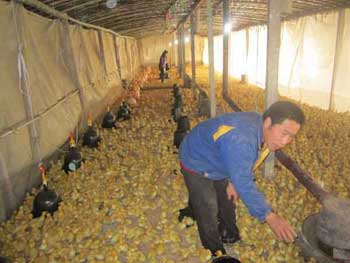Rural netizens play games 2.8 hours a week, market potential is exploding
Gao Jing, 28, who lives in Beijing, spends almost all her time on the Internet, working online during office hours, posting Weibo on her way to and from work, going to Taobao during her lunch break and watching American TV dramas on Sohu videos in the evening. Her annual income is about 100000 yuan, about 60% of which is spent through the Internet.
Feng Tao, a young farmer who lives in Shuangliu, Chengdu, earns about 40,000 yuan a year. He has a computer and a 2G mobile phone and uses the Internet as his main form of entertainment. He mostly plays games and watches movies and videos on the Internet, and occasionally uses his computer and mobile phone to browse the news. Only 10% of his spending is online, mainly for online games and Taobao.
This is a true portrayal of the lives of netizens in two different cities in China.
"the comparison of the two cases is not difficult to see that at present, the degree of Internet networking of urban residents is already very high, the Internet market is becoming saturated, and the rural market, which is dominated by rural youth like Feng Tao, is exploding with great potential." Zhou Yuan, managing director of Boston Consulting Company, told reporters.
According to the "China Digital New Generation 3.0" report released by Boston Consulting yesterday, the number of Internet users in China will increase by nearly 200 million to 700 million by 2015, almost twice the number of users in the United States and Japan combined. The growth is largely driven by people aged 51 and above and rural residents. Among them, from 2011 to 2015, China's rural residents will contribute more than 1/3 to Internet growth.
This coincides with the results of a previous survey conducted by Ericsson Consumer Research on China's rural areas: 41% of rural respondents believe that it is important to have access to the Internet anytime, anywhere. At present, in rural areas, the ownership rate of landlines has dropped to 46 per cent, while the ownership rate of mobile phones has risen to 90 per cent. The ownership rate of home computers is 31%, and 16% of rural respondents said they plan to buy computers in the next 12 months. Nowadays, individual entertainment such as surfing the Internet with computers and chatting on mobile phones is becoming the daily life scene of some rural residents.
"the rural market accounts for 26 per cent of Internet users and 22 per cent of online time, which is considerable for a market segment that has not yet received the same level of attention as urban and young groups." Said Christoph Nettesheim, a senior partner in Boston.
Different from urban netizens, rural netizens are characterized by low level of education and income, and the Internet is mainly motivated by entertainment needs, such as watching videos, online games and online chat.
Zhouyuan pointed out that although rural netizens generally use the Internet relatively little, their average daily Internet time of three hours cannot be ignored. Because the Internet gives them access to products and services that are not available in other ways. For example, they like to shop online and spend more time on online games than any other group, averaging about 2.8 hours a week.
Especially in the field of micro-payments such as online games, Zhouyuan said that rural netizens are even more willing to pay than urban netizens.
Feng Tao spends more than 70 yuan a month on online games. But one of his grievances with the Internet is speed. He has recently become obsessed with smartphones, one of the reasons is that smartphones provide a better mobile Internet experience.
Zhouyuan believes that with the rapid growth of rural Internet users, another noteworthy phenomenon is that more and more farmers have started or are starting businesses through the Internet. For example, the online sales revenue of Shaji Town in Jiangsu Province reached 500 million last year, while the cashmere industry in Qinghe East Gaozhuang in Hebei Province based on local resources and the tea network sales in Anxi, Fujian Province have also developed vigorously.
However, Zhouyuan also pointed out that compared with the optimistic situation of the rapid growth of rural Internet users, there are many fewer excellent Internet services for the rural market, while the construction of some supporting facilities has not kept up, which will be potential markets in the long run.
Related
- A course of planting techniques and methods on how to grow carrots
- How to plant the latest tulips?
- Is it better to pick tea in the morning or in the afternoon? When is the best time for tea to be picked? what is the third or fifth tea?
- Launch Yuanxiao Happy combination Haocha + Tea Yuan healthy Taste
- Penghu Tourism "Fireworks 20 Parade with You"
- 2022 West Lake Happiness holds "Digital Revitalization Voucher" and draws iphone13 and laptop.
- Banqiao Fuzhou social houses are designed to change start-up combined with police elimination to create a safe and livable environment
- The convenient measure of "mechanical weeding" in Xinbei has been abused and the Agriculture Bureau has imposed heavy penalties on the illegal land consolidation.
- Changgeng University Joins Hands with Four Memory Factories to Rescue Memory Talent Shortage
- The list of Taiwan's top 100 MVP managers is listed by the Director-General of the Farmers' Association of Sanxia District.



